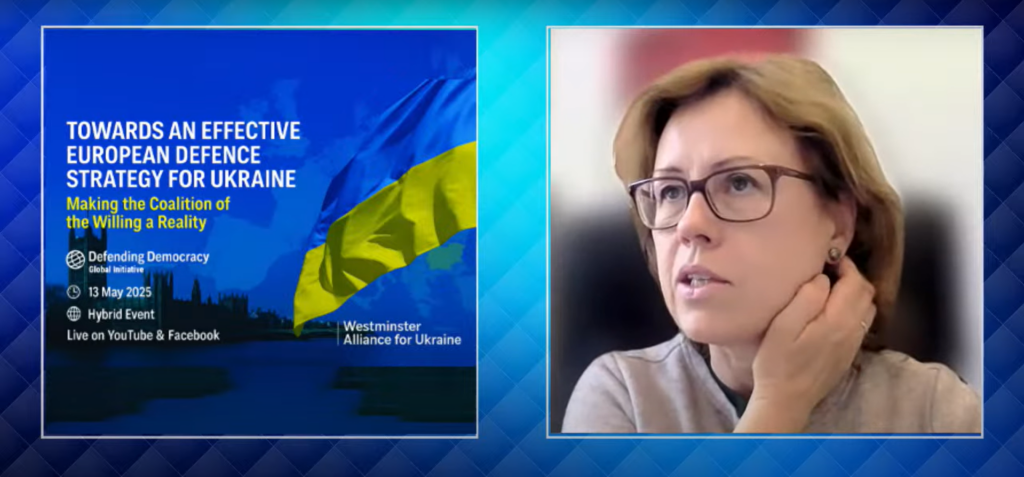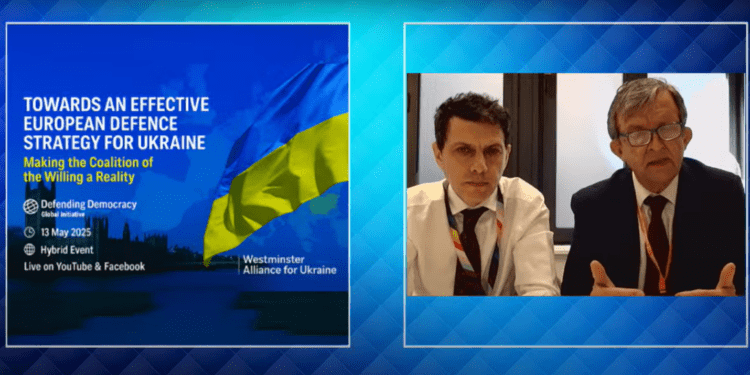The corridors of the House of Commons of the British Parliament witnessed the birth of a new initiative that could radically change Europe’s approach to supporting Ukraine. The event was organized under the auspices of the International Initiative “Defending Democracy” and with the exclusive media support of CIVIL – Center for Freedom, whose president is Xhabir Deralla. The conference united politicians and public figures from the five largest European countries around a common goal — to transform the “coalition of the willing” from a political declaration into an effective tool for victory.
“We chose Westminster not by chance — in 1940, it was the last corner of freedom in Europe,” Olivier Védrine, Administrator of the Jean Monnet Association and French political scientist and journalist, explained the organizers’ motives. Representatives of France, Germany, Italy, Great Britain, and Poland laid the foundation for a new form of European cooperation. Roger Casale, former MP/founder of New Europeans and co-founder of the Defending Democracy Global Initiative, did not hide his ambitions: the coalition should become a bridge between the noble goals of governments and the practical reality of European defense.
Lina Kushch, the First Secretary of the National Union of Journalists of Ukraine (NUJU), spoke about the unique experience of countering russian disinformation:
“Russia is waging the war not only with missiles, but also with disinformation. In every country that you represent and that stands with Ukraine today, russian propaganda adapts, manipulating language, history, religion, and political issues. Ukrainian journalists have gained unique experience in countering disinformation in wartime. And we are ready to share this experience with you.”
However, behind the heroic achievements lies a dramatic reality. According to research by the NUJU, more than a quarter of Ukrainian journalists work without a salary, and local newsrooms, especially in frontline areas, are teetering on the brink of survival. Lina Kushch did not hide her concern:
“The newsrooms have a very thin safety cushion and expect the situation to worsen after the freezing of U.S. funds and due to the lack of other financial support.”
Olha Danyliuk, the Editor-in-Chief of Volynska Hazeta newspaper and co-leader of the ViLNi Media project, promoting independent journalism and free speech in Ukraine, reminded those present of the true price of truth:
“I would like to mention one important name today — Ukrainian journalist Victoria Roshchina, who was killed in russian captivity. Her body was brought to Ukraine, returned without eyes, without brains… We don’t even know what happened to her,” she said, emphasizing that this is just one of many tragedies. “We must not only remember the dead but also support all the voices of Ukrainian journalists in Ukraine with financial support, platforms, connections, and networks.”
Mika Beuster, President of the German Journalists’ Association (DJV) and Chief Topic Reporter at VRM Mittelhessen, announced that the organization would continue to financially support Ukrainian media, but also drew attention to the broader challenges of hybrid warfare: “We have an information war, but we see that Europe is not prepared for such attacks. That is why we need a legislative framework for digital resilience. We are not sovereign in our digital infrastructure.”
Dr. Wolfgang Ressmann, Chairman of Youth4Media and Media Dialogue, an expert in media literacy and civil society development, put the discussion in historical perspective:
“Ukraine is also fighting for our freedom, for our system and our values. And not only Ukraine, but all the other former Soviet republics: Armenia, Georgia, Belarus, are still under the pressure of the old imperial thinking. And I think we have to overthrow this imperial thinking that comes from russia.”
The Westminster Coalition plans to expand its activities far beyond the five founding countries, involving 31 countries in the coalition. Within the walls of Westminster, not just another solidarity initiative was born, but an attempt to create a new mechanism of European unity – one that would unite parliamentarians, journalists, and civil society for a common goal.

Tetiana Sinkova

 THE NATIONAL UNION OF
JOURNALISTS OF UKRAINE
THE NATIONAL UNION OF
JOURNALISTS OF UKRAINE
















Discussion about this post